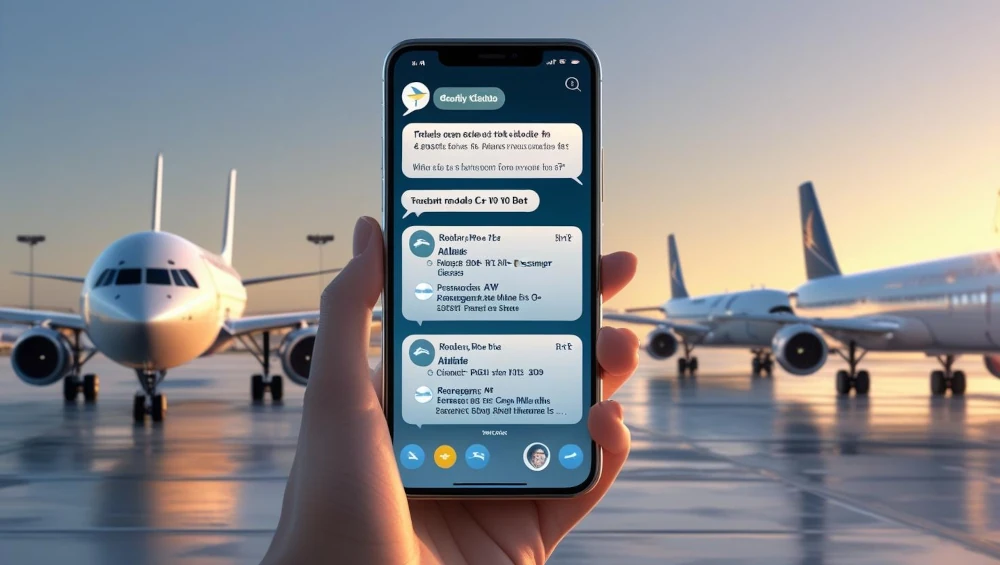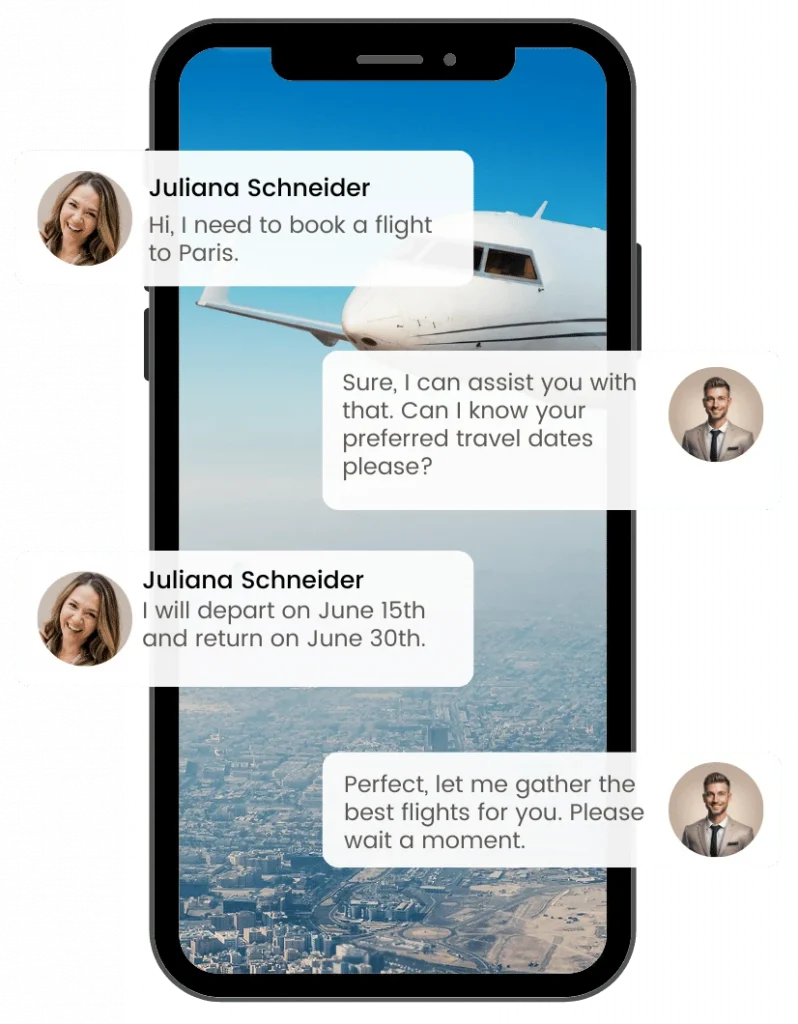AI is already changing how aviation companies run their businesses. Airlines, charters, and even flight schools are using AI agents to cut costs, reduce delays, improve safety, and deliver better customer service.
If you’re not exploring AI, your competitors probably are.
This article highlights real examples of AI in aviation, the benefits it brings, where it can go wrong, and what leaders need to know about getting started.
What are the AI agents
AI agents are software programs that use data, algorithms, and machine learning to perform specific tasks, often autonomously and in real time. These agents are trained to recognize patterns, make decisions, and carry out actions with minimal human intervention.
Examples of AI agents in aviation include:
- Chatbots and Virtual Assistants: Handle booking inquiries, flight status updates, and customer service questions online or by phone.
- Predictive Maintenance Agents: Analyze real-time aircraft sensor data to forecast when a part might fail, helping to avoid costly breakdowns and delays.
- Computer Vision Agents: Scan baggage, monitor security cameras, and identify potential threats in airports.
- Scheduling and Optimization Tools: Automatically plan efficient flight paths, crew assignments, and gate usage for smoother operations.
Marketing & Sales Automation via AI Agents
AI agents can automate marketing and sales processes, such as:
- Chatbots for customer inquiries (e.g., WhatsApp, Facebook, websites)
- Qualifying and routing leads
- Lead enrichment, scoring, and assignment
- Email campaign management
- Automated B2B outreach (personalized messages on LinkedIn, email, SMS, etc.)
- Scheduling follow-ups
- Answering phones outside working hours
- Meeting scheduling
- Proposal and quote generation
- CRM data entry and management
- Review and testimonial requests
- Sales funnel progression triggers
- Social media posting and monitoring
- Content personalization
- Automated reporting

Operational Procedures Automation via AI Agents
Examples include:
- Knowledge base updates
- Order processing
- Customer onboarding
- Invoice creation and payment reminders
- Document and contract management
- Support ticket triage
- Internal notifications and escalations
- Employee onboarding
- Survey and feedback automation
- Compliance monitoring
- Recurring task management
- Send personalized LinkedIn, email, social messages, SMS or Whatsapp to prospects.
- Schedule follow-ups based on engagement or time triggers.
AI-Based Forecasting
SEO for AI – GEO
GEO focuses on optimizing content for AI-powered engines and generative search systems like ChatGPT, Bing Copilot, and Google SGE—ensuring your content is discoverable and cited as authoritative and relevant in conversational answers and AI-driven summaries.
Benefits of AI Agents in Aviation
- Reduced Operational Costs: Automate repetitive tasks and minimize the need for additional hires as your business grows.
- Increased Sales: AI sales assistants can upsell services and recommend upgrades, boosting revenue.
- Faster Customer Service: AI agents can provide instant answers, improving response times and satisfaction.
- Lower Staffing Expenses: Virtual agents manage routine inquiries, freeing up staff for complex tasks.
- Fewer Costly Mistakes: AI reduces human error in scheduling, bookings, and maintenance.
- Improved Efficiency: AI processes data and makes decisions quickly, streamlining operations.
- 24/7 Availability: AI agents never need breaks—they operate around the clock.
- Better Resource Allocation: AI handles repeat queries, allowing skilled staff to focus on higher-value work.
- Consistent Service Quality: AI ensures standardized service across all channels.
- Scalable Solutions: AI easily handles increased workloads as the company grows.
Can AI Agents Replace People?
AI agents are best used to augment human work, not replace it.
- Automating Routine Tasks: AI handles repetitive work, freeing up employees.
- Supporting Better Decisions: AI provides insights and recommendations.
- Reducing Pressure: AI picks up excess workload during busy periods.
- Improving Accuracy: AI reduces manual errors in scheduling and inventory.
AI agents are digital co-workers, enabling staff to focus on complex problems and customer service.
AI Automation isn’t about replacing people — it’s about letting them focus on what’s most important. It helps people spend less time on boring tasks, so they can focus on what really matters – being creative, solving problems and making a meaningful impact. Let computers handle the routine stuff, and let people do the important work.
Can AI Agents Make Mistakes?
Yes, AI agents can make mistakes if fed with incorrect or biased data, or if situations change beyond their training. Human oversight remains essential to catch errors and review AI recommendations.
Case Studies of AI in aviation
1. AI Chatbots for Sales and Support
- Problem: High volumes of customer queries overwhelm human agents and can lead to poor service, loss of potential sales, unhappy customers and affected reputation.
- Solution: AI-powered chatbots handle common questions, assist the sale, capture change requests, baggage claims, etc.
Recently I had to call an airline several times in order to operate an invoice change and to find out where the invoice can be downloaded. I had to browse the website of an airline for 30 minutes to find out if they allow baby strollers on board and what is the age limit for strollers. These could have been avoided easily by using an AI chatbot.
FlyingAssist AI-Powered Aviation Chatbot: Boosting Sales and Efficiency
FlyingAssist is implementing AI-powered chatbots for aviation to provide instant, 24/7 customer support and sales responses. The chatbot is trained with aviation-specific FAQs, integrates with booking and CRM systems, and delivers personalized answers in multiple languages. This helps companies capture more leads, increase sales, and cut support costs by automating routine conversations.
As the team states:
“Never miss a lead or inquiry again – even after office hours.”

Malaysia Airlines: Machine-Learning Chatbot Boosts Sales and Customer Service
Malaysia Airlines partnered with Amadeus and Google Cloud to launch MHchat, a machine-learning-powered chatbot on Facebook Messenger. Customers can now search, book, and pay for flights to over 1,000 destinations 24/7, making service faster and more convenient. The project streamlined booking processes and increased revenue from digital channels.
“Thanks to the development of MHchat through Google and Amadeus, we have added a convenient new channel for our customers to interact with us.” Alwin Loh, Head of Digital Transformation & Innovation
Other examples of companies implementing AI chatbots:
- Lufthansa’s Chatbot Mildred: Lufthansa’s AI Booking Assistant “Mildred”
- AirAsia’s AVA: AVA: AirAsia’s AI-Powered Virtual Assistant
2. Flight Delay Prediction & Minimization
Challenge: Unpredictable weather, technical issues, and airspace congestion often result in costly flight delays and frustrated passengers.
AI-Powered Solution: Advanced AI systems analyze huge volumes of real-time and historical data—including weather forecasts, aircraft status, and air traffic conditions—to anticipate and manage delays more accurately than traditional methods.
United Airlines: Proactive Delay Communication with AI
United Airlines leverages AI in its mobile app to keep passengers informed during flight disruptions, reducing uncertainty and stress. Their “Every Flight Has a Story” feature uses generative AI to quickly scan dozens of flight systems, summarize reasons for delays, and draft clear, detailed messages. Before sending, United’s team reviews and personalizes these updates for accuracy and empathy.
The result: passengers receive timely, transparent explanations in simple language, which improves trust, satisfaction, and loyalty.
As United Airlines CIO Jason Birnbaum explains:
“If we can use GenAI to speak to a larger audience more often, we know that will drive NPS even more.”
NASA & FAA: Modernizing Air Traffic Control with AI
NASA and the FAA are pioneering AI and machine learning solutions to transform air traffic management across the U.S. Their AI/ML tools:
- Predict and optimize flight paths based on real-time conditions
- Recommend the most efficient runway configurations
- Digitize and transcribe air traffic control instructions
- Provide rapid, data-driven decision support for controllers
These advances empower air traffic controllers to make faster, more informed decisions—cutting delays, enhancing safety, and streamlining airport operations.
3. Optimizing Fuel Consumption
Challenge: Fuel is one of the largest expenses for airlines and a significant contributor to aviation’s environmental impact.
AI-Powered Solution: Advanced AI algorithms analyze real-time flight data to recommend the most efficient routes, altitudes, and speeds, helping airlines minimize fuel consumption and reduce carbon emissions.
Volotea: AI-Driven Fuel Efficiency Across the Fleet
Volotea leverages AI-powered solutions to enhance fuel efficiency and monitor aircraft performance throughout its fleet. These systems process detailed, tail-specific flight data to:
- Deliver real-time insights on optimal flight and taxi operations
- Optimize fuel use during every phase of flight, including descent and taxiing
- Provide pilots with actionable recommendations for fuel-saving decisions
By adopting these innovations, Volotea reduces fuel costs, responds swiftly to maintenance needs, and advances its sustainability goals—demonstrating how AI technology can deliver both economic and environmental benefits for the airline industry.
4. Air Traffic Control & Management
Challenge: Surging air traffic makes managing congestion and ensuring safety in the skies and at airports increasingly complex.
AI-Powered Solution: Artificial intelligence helps air traffic controllers manage flight flow, maximize capacity, and minimize risks through automation and advanced forecasting.
EUROCONTROL: Smarter Skies with AI
AI for Traffic Forecasting:
EUROCONTROL employs AI and machine learning to process thousands of data points—from weather patterns to airline schedules—dramatically improving the accuracy of air traffic forecasts. In some trials, error rates have dropped by as much as 71%.
Automating Flight Plan Processing:
AI-driven automation enables EUROCONTROL to boost flight plan processing rates from 96.3% to 99.5%. This automation relieves staff from manually handling over 30,000 plans daily, optimizing workflow and reducing delays.
Traffic Prediction at Maastricht UAC:
At Maastricht Upper Area Control Centre, intelligent AI tools are used to enhance trajectory and take-off time predictions, highlight potential traffic hotspots, and forecast controller workload. These insights allow for more effective staffing and proactive airspace management, leading to safer and more efficient skies.

5. Security and Threat Detection
Challenge: Fast, accurate identification of potential security threats is difficult with traditional surveillance, increasing the risk of incidents at busy airports.
AI-Powered Solution: AI-enhanced surveillance systems automatically detect unusual behaviors or suspicious items, enabling faster and more reliable threat detection.
Aurora: Deep Learning AI Boosts Airport Security
Aurora’s AI-powered facial recognition, already deployed at Heathrow and other major airports, enables secure and efficient self-boarding by matching travelers’ faces with boarding passes in seconds. Using advanced deep learning, Aurora’s system delivers high-accuracy recognition even in challenging lighting conditions, reducing processing times and the risk of human error.
Aurora is also expanding its AI applications beyond security—developing solutions for smart baggage handling and predicting parking availability. These innovations not only strengthen airport safety but also streamline operations and improve the overall passenger experience.
6. Luggage Handling and Tracking
Challenge: Misplaced or lost luggage remains one of the top frustrations for air travelers and can significantly impact customer satisfaction.
AI-Powered Solution: Artificial intelligence now enhances baggage tracking by using advanced image recognition and real-time data, automatically flagging potential issues for rapid intervention.
SITA & IDEMIA: Revolutionizing Baggage Management with Computer Vision
SITA and IDEMIA have teamed up to introduce AI-driven computer vision solutions to airport baggage handling. By integrating IDEMIA’s advanced baggage image recognition system (ALIX™) into SITA’s industry-leading baggage management platforms, airports can now follow each bag’s journey with unprecedented accuracy—from check-in to arrival.
Key Benefits:
- Significantly Fewer Lost Bags: Building on SITA’s WorldTracer® platform—which has already achieved a 77% reduction in lost baggage—airports experience fewer delays and missing luggage incidents.
- Real-Time Issue Detection: AI immediately flags anomalies, allowing staff to intervene before baggage is misplaced.
- Increased Efficiency: Automated monitoring speeds up baggage handling, improving operational flow even during peak travel times.
- Enhanced Passenger Experience: Travelers benefit from a smoother, more secure journey and timely baggage retrieval, even as airport volumes increase.
7. Pilot Training and Simulations
Challenge: Traditional pilot training programs are often costly and lack personalization, making it difficult to address individual learning needs and ensure consistent quality.
AI-Powered Solution: AI-driven simulators deliver adaptive, data-rich training modules with real-time feedback, enabling personalized learning, skill assessment, and continuous improvement.
AIR BUSAN: Enhancing Training with CAE’s AI-Powered System
AIR BUSAN became Korea’s first airline to implement CAE Rise, an AI-powered, data-driven training platform for pilots. By harnessing big data analytics, the system continuously monitors and evaluates pilot performance—for example, measuring reaction times during critical landing procedures. This ensures standardized, high-quality training, enhances flight safety, and provides actionable feedback for ongoing improvement in pilot skills.
FlySto: Turning Flight Data into Actionable Insights
FlySto offers pilots, flight instructors, and safety managers an advanced platform to upload and analyze flight logs.
8. Crew Scheduling
Challenge: Crew scheduling is an extremely complex task, requiring consideration of numerous variables, regulations, and last-minute changes—often leading to inefficiencies, higher costs, and compliance risks.
AI-Powered Solution: AI-driven scheduling software automates and optimizes crew rosters, enhancing efficiency, reducing compliance risks, and cutting operational costs.
Ryanair: Maximizing Utilization with Optifly’s AI Scheduling
Ryanair partnered with Optifly to revolutionize its crew and flight scheduling through a cloud-based AI technology. By piloting Optifly’s system across its Italian fleet, Ryanair was able to increase seat capacity in that region by an impressive 38% for summer 2022 compared to 2019—three times the growth observed in other parts of its network.
Following this success, Ryanair expanded the rollout network-wide, benefitting from:
- Quicker, More Adaptive Scheduling: Rapid adjustment to demand and operational changes.
- Improved Aircraft Productivity: Increased utilization and reduced idle time.
- Scalable Efficiency: Enhanced ability to manage scheduling complexity across all European operations.
By leveraging AI, Ryanair now creates smarter, more flexible, and cost-effective schedules, paving the way for higher productivity and optimized resource allocation.
9. Revenue Management and Dynamic Pricing
Challenge: Maximizing revenue through optimal ticket pricing is highly dynamic and data-intensive.
AI-Powered Solution: AI analyzes real-time demand, competitor prices, and seasonal trends to set and adjust fares automatically.
Aer Lingus: Smarter Pricing with AI
Aer Lingus has implemented Datalex’s AI-driven pricing engine, enabling real-time fare adjustments based on demand, booking patterns, and customer preferences. The result:
- Customer-Centric Offers: Personalized, market-responsive fares
- Revenue Growth: Optimized prices during high and low demand
- Greater Flexibility: Instant response to disruptions and competitor changes
“This is why the potential offered by the Datalex Pricing AI product for more flexible, intelligent and customer-centric pricing is compelling.”
— Susanne Carberry, Chief Customer Officer, Aer Lingus
10. Predictive Maintenance
Challenge: Unexpected equipment failures and unscheduled maintenance can cause costly delays and cancellations.
AI-Powered Solution: Predictive analytics powered by AI process sensor data to forecast when parts may fail, enabling proactive scheduling of maintenance and reducing downtime.
GE: Moving from Reactive to Proactive Maintenance with Predix
GE uses Predix, its industrial AI platform, to collect data from jet engines and wind turbines and apply machine learning for predictive maintenance. By creating digital twins—virtual models of their equipment—GE can:
- Predict failures before they happen
- Optimize maintenance schedules
- Reduce unplanned outages and downtime
- Boost operational efficiency and asset reliability
This shift to proactive maintenance has helped GE reduce costs, prevent service disruptions, and ensure higher reliability across their fleet.
How Does It Work? Step-by-Step AI Implementation with FlyingAssist
- Discovery Call – We start with a brief conversation to understand your business and identify processes that can be streamlined or automated using AI agents.
- Information Gathering – Together, we collect the necessary data, guides, FAQs, and process details to train your AI assistants effectively.
- Access & Integration – Our team securely connects and integrates AI solutions within your existing workflows and systems.
- Agent Testing – You’ll test the AI agents in a safe environment—reviewing responses and checking accuracy—ensuring the solution meets your real-world needs.
- Launch, Monitoring & Continuous Improvement – Once you approve the solution, we deploy it live within your operations. FlyingAssist then provides ongoing monitoring, proactive support, and regular performance reviews—ensuring your AI agents are always optimized for your evolving needs. As your business grows or requirements change, we make continual improvements and adjustments to maximize results.
Do I Need to Learn AI?
No technical expertise is required. Our team handles all setup, training, and integration—so you can focus on your business, not the technology.
Ready to see how AI can transform your company?
Schedule your discovery call!
